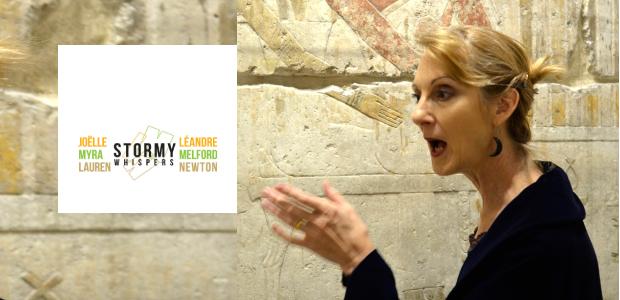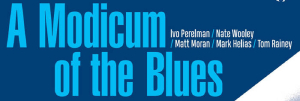Lauren Newton: Humor has its place here, too

Lauren Newton is not a singer. She is an artist who uses surrounding sounds, simple words and even consonants to create a great meaningful performance. She told me about her new CD “Stormy Whispers”, her life in Stuttgart and her still evolving language of improvisation.
Your last CD „Stormy Whispers” was recorded during Ad Libitum Festival in Poland. What do you remember the most about this Festival?
It was a very well organized festival, friendly people, nice venue, helpful stage-crew, great sound technician and very attentive and appreciative audience! It was an amazing experience for me to meet and perform with Myra Melford and Joëlle Léandre, my first meeting with Myra! When we arrived on stage, the music came like a volcano stirring from somewhere inside a mountain, suddenly erupting! I think this can be heard very distinctly on “Whisper 1” on the CD “Stormy Whispers”.
The motto of that edition sounded “Women Alarm!” In my opinion, unfortunately women are still under-hired as jazz musicians. Why is it like that? (What do you think about this disproportion?
I don’t think women are ‘under-hired’. There are simply not as many women musicians working in this particular field of music as there are in classical music or other arts.
You decided to move to Germany in 70’s. Why?
I came to Stuttgart, Germany, in 1974 by way of a study-abroad program offered by the University of Oregon where I was studying music. It was my last bachelor year so after receiving my BA diploma, rather than return to the US, I decided to register for master studies at the Music School in Stuttgart. During the next two years I quickly got involved in the local music scene. I was performing contemporary classical as well as jazz-rock and performed all around Germany. Soon people began to recognize me because of my vocal work and improvisation style.
How do you feel about Germany now and then? Is it your place on earth?
Obviously, after such a long time it has become my home base and it’s where people

know and respect my work.
Your cooperation with Joëlle Léandre lasts for many years. Listeners may feel very strong connection between two of you. Tell me, what have you gain from this friendship and cooperation on stage and in your private life?
Joëlle and I have been working together since 1994. We have the same sense of how to communicate through music. From the very first meeting we decided to play some concerts together. Both of us go directly into the music when we play or sing. So when we started playing together the effect immediately doubled; the energy, the ideas, the love of music, the enjoyment of being in the moment and in the music.
Have you ever heard that your music is “too different for listeners”, “too advanced”? How do you react on this kind of statements? Do you try to convince someone to your art, someway?
It depends on who is saying “too advanced”. Of course, if someone has never been curious enough to listen to free improvised music with an open-mind, it can be challenging. I am aware that the majority of people want to be entertained rather than ‘do the work’ of listening to freely improvised music. For some people it is not easy to let go of preconceived ideas of what music ‘should be’ and just allow the music to speak for itself! I do not wish to convince anyone. My way of expressing music is as it is and it is always evolving. What could be more exciting? John Cage said, “I can’t understand why people are frightened of new ideas. I’m frightened of the old ones.” Without new ideas there would be no evolution, no joy, no discovery of self in its purest sense! Cage’s statement fits well into the present time.
What kind of role does “meaning of a word” play in your music?
Early in my study years I began to look for repertoire (even classic rep.) that did not have lyrics, which was nearly impossible. So when I began in the ‘jazz’ scene, it seemed the perfect situation to use my voice as an instrument. Even my music partners encouraged me to do this! By standing next to and listening carefully to instrument players, I learned how to develop my way of singing and my own wordless language, one that helped me express my ideas and feelings. There were very few singers doing this in the 70s. In the 80s I performed with the Vienna Art Orchestra and composer/arranger Mathias Rüegg would often propose very avant-garde ideas to me. Because I love challenges, these were perfect chances to experiment with words. How I work with words always depends on the situation, the people I perform with, and even the audience. In one piece I might prefer to metamorphose one word, in another I use only just enough words to allow the listener to understand intuitively, like in a word game or an anagram. Sometimes I simply read/sing a text that is esthetically pleasing to me. The possibilities are endless, especially if I want to combine or alternate between singing and speaking with or without words. In addition, humor has its place here, too.

You are also known for interpreting the poems by Ernst Jandl. How does the process of working on poetry look like in your case?
Yes, I worked with Ernst Jandl, the Austrian poet, for over 10 years who inspired me greatly through his ‘visual poetry’ and experimental word-works and his very unique way of reciting his poetry. What an honor to learn about and experience his work and to perform with him. Three things in particular have inspired my own work with words; the visual poetry which focuses on single letters or the noise of a consonant, the rhythmical way he would read his poetry, and his very precise way of getting the message across to an audience. After Jandl’s death in 2000, I was asked by many different organizers to perform a solo program in his honor with his poetry, but I always felt his presence in the room. I learn by perceiving, listening, and exploring all possibilities with and through my voice and always on the foundation of music. Ernst Jandl inspires me even to this day.
How does the pandemic of COVID-19 effects your every day life as a musician?
Six concerts were cancelled so I decided to use the lockdown time to finally work on my book, which actually has been an on-going project since about 25 years! I hope to release this work very soon.
- Aby wysyłać odpowiedzi, należy się zalogować.







